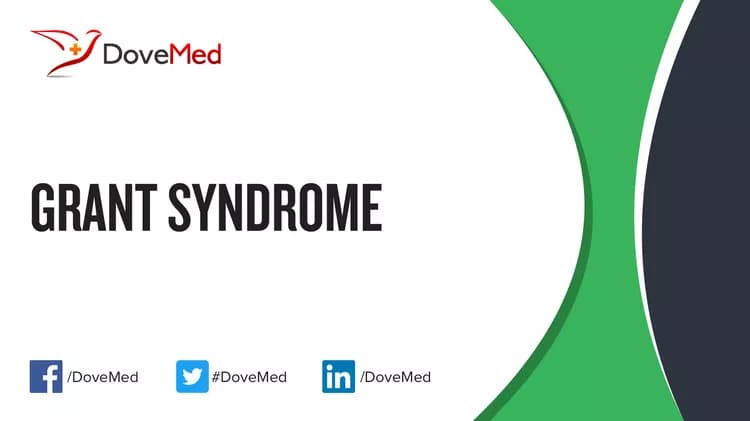What are the other Names for this Condition? (Also known as/Synonyms)
- Persistent Wormian Bones, Blue Sclerae, Mandibular Hypoplasia, Shallow Glenoid Fossae and Campomelia
What is Grant Syndrome? (Definition/Background Information)
- Grant Syndrome is a rare osteogenesis imperfecta-like disorder, described in two patients to date. There have been no further descriptions in the literature since 1986
- It is characterized clinically by persistent wormian bones, blue sclera, mandibular hypoplasia, shallow glenoid fossa, and campomelia
(Source: Grant Syndrome; Genetic and Rare Diseases Information Center (GARD) of National Center for Advancing Translational Sciences (NCATS), USA.)
Who gets Grant Syndrome? (Age and Sex Distribution)
- Grant Syndrome is an extremely rare congenital disorder. The presentation of symptoms may occur at birth
- Both males and females may be affected
What are the Risk Factors for Grant Syndrome? (Predisposing Factors)
- A positive family history may be an important risk factor, since Grant Syndrome can be inherited
- Currently, no other risk factors have been clearly identified for the syndrome
It is important to note that having a risk factor does not mean that one will get the condition. A risk factor increases one’s chances of getting a condition compared to an individual without the risk factors. Some risk factors are more important than others.
Also, not having a risk factor does not mean that an individual will not get the condition. It is always important to discuss the effect of risk factors with your healthcare provider.
What are the Causes of Grant Syndrome? (Etiology)
The genetic cause of Grant Syndrome and pattern of inheritance are not known at the present time.
What are the Signs and Symptoms of Grant Syndrome?
The signs and symptoms of Grant Syndrome may include:
- Down-sloping shoulders
- Tibial bowing
- Abnormal cortical bone morphology
- Blue sclerae
- Bowing of the long bones
- Decreased skull ossification
- Frontal bossing
- Joint dislocation
- Joint hyperflexibility
- Large fontanelles
- Micrognathia
- Wormian bones
- Abnormality of pelvic girdle bone morphology
- Abnormality of the glenoid fossa
- Abnormality of the palate
- Abnormality of the ribs
- Brachycephaly
- Depressed nasal bridge
- Facial asymmetry
- Flat face
- Large face
- Muscular hypotonia
- Narrow chest
- Open bite
- Short stature
- Skin dimple over apex of long bone angulation
- Sprengel anomaly
(Source: Grant Syndrome; Genetic and Rare Diseases Information Center (GARD) of National Center for Advancing Translational Sciences (NCATS), USA.)
How is Grant Syndrome Diagnosed?
Grant Syndrome is diagnosed on the basis of the following information:
- Complete physical examination
- Thorough medical history evaluation
- Assessment of signs and symptoms
- Laboratory tests
- Imaging studies
- Biopsy studies, if necessary
Many clinical conditions may have similar signs and symptoms. Your healthcare provider may perform additional tests to rule out other clinical conditions to arrive at a definitive diagnosis.
What are the possible Complications of Grant Syndrome?
The complications of Grant Syndrome may include:
- Poor feeding
- Inability to thrive in the neonatal phase
- Severe pain and discomfort due to skeletal problems
Complications may occur with or without treatment, and in some cases, due to treatment also.
How is Grant Syndrome Treated?
There is no cure for Grant Syndrome, since it is a genetic condition. The treatment is usually given to manage the signs and symptoms and any complication that develops.
How can Grant Syndrome be Prevented?
- Currently, Grant Syndrome may not be preventable, since it may be a genetic disorder
- Active research is currently being performed to explore the possibilities for treatment and prevention of inherited and acquired genetic disorders
- Regular medical screening at periodic intervals with tests and physical examinations are recommended
What is the Prognosis of Grant Syndrome? (Outcomes/Resolutions)
- The prognosis of Grant Syndrome is dependent upon the severity of the signs and symptoms and associated complications, if any
- Individuals with mild conditions have better prognosis than those with severe symptoms and complications
- Typically, the prognosis may be assessed on a case-by-case basis
Additional and Relevant Useful Information for Grant Syndrome:
The following DoveMed website link is a useful resource for additional information:
Related Articles
Test Your Knowledge
Asked by users
Related Centers
Related Specialties
Related Physicians
Related Procedures
Related Resources
Join DoveHubs
and connect with fellow professionals


0 Comments
Please log in to post a comment.